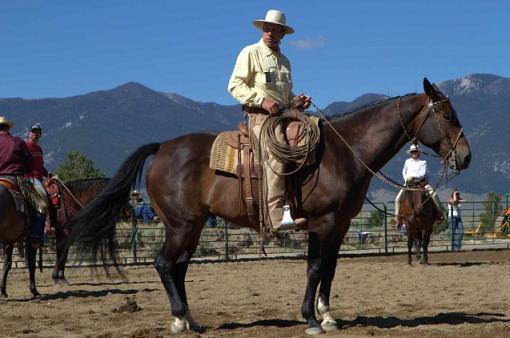Review: Buck

"A lot of times, rather than helping people with horse problems," says Buck Brannaman, "I'm helping horses with people problems."
The subject of the documentary Buck, horse trainer Brannaman travels America teaching horse owners positive ways to communicate with their animals. He is the gentlest of gentle souls, a skilled cowboy whose believes the best way to train a horse is through leadership and sensitivity, not brutality and punishment. Buck is as gentle as its subject, a finely made, ever thoughtful film that shows us how Brannaman's approach applies not only to horses, but to people as well. The movie opens Friday in Austin.
Brannaman's skill with horses is amazing. As he transforms a frightened, unruly horse into a calm, obedient one in a matter of minutes, it's as if he has unique insight into the equine mind. But Brannaman would be the first to say that while he has many well honed skills, he has no special relationship with horses. He merely understands that the best way to work with a horse -- or a human -- is to instill trust, not fear.
Brannaman knows fear all too well. From the time he was old enough to twirl a rope, he and his older brother, Smokie, were a well known trick-roping act, appearing frequently at rodeos and on TV. What their fans didn't realize is that the brothers suffered the wrath of a hot-tempered and physically abusive father who beat them unmercifully. When their mother died, the abuse worsened to the point where they were placed in a foster home.
Fortunately, Brannaman's foster parents were loving and supportive, helping restore his self confidence and trust in others and encouraging him to pursue his interest in horses. He learned his horse training methods from legendary trainer Ray Hunt, a pioneer in the kinder-and-gentler school of communicating with the animals. Brannaman has been employing Hunt's methods for more than three decades, spending nine months a year conducting clinics for horse owners around the country.
Buck does a fine job of chronicling Brannaman's life and career, creating an intriguing portrait of a man who has turned agony into insight. But the film is about so much more, for Brannaman's story matters far less than the many lessons he can teach us about ourselves. "Your horse is a mirror to your soul," he says early in the film, "and sometimes you may not like what you see. Sometimes, you will." This sentiment is painfully illustrated in a scene featuring a dangerous horse that is mostly beyond Brannaman's help. When the fearful, mentally damaged colt bites and tramples a hapless cowboy, it's obvious that his owner is just as fearful and damaged. The owner has projected her own problems onto the horse, just as people often project our problems onto each other.
Buck breaks no new cinematic ground, but it's slickly produced, with a pleasantly inspirational tone that fits perfectly with Brannaman's take on relationships both human and animal. The cinematography is especially beautiful, with plenty of gauzy, perfectly framed Western vistas and warmly lit close-ups of its human and equine subjects. Although Buck is director Cindy Meehl's first effort, the striking visuals are not surprising. Meehl has had a long career in fashion design and fine art painting, and she worked on Buck with veteran cinematographers are Luke Geissbuhler and Guy Mossman.
My only problem with Buck is that it's a bit repetitive. Some scenes are unnecessarily redundant, and even at 88 minutes, Buck feels slightly too long. But this is a very minor complaint; Brannaman is such a fascinating character that the repetition is tolerable. And Buck benefits greatly from numerous interviews providing plenty of insight into Brannaman and his philosophy. The best of the interviews is with Robert Redford, who hired Brannaman as a technical adviser for The Horse Whisperer. (One of Brannaman's horses appeared in Redford's film, despite Redford's worry that the horse wasn't a "professional actor.")
An appealing character study and thought-provoking story, Buck is a rare family-friendly film that will please arthouse audiences also. (Indeed, the film won the Documentary Audience Award at the 2011 Sundance Film Festival, then went on to screen at SXSW this year.) Even if you've never been near a horse, you'll appreciate what Buck says about human nature.

